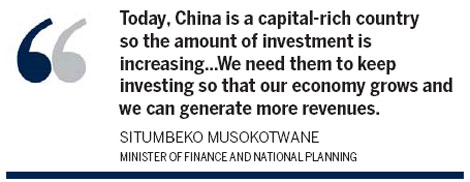News
A magnet for Chinese investors
(China Daily)
Updated: 2011-05-23 07:56
 |
Large Medium Small |

Economic diversification a priority for Zambia, as it strives to limit its dependence on copper
A tropical, landlocked country in southern Africa, Zambia's vast mineral, precious metal, water and land resources make it one of the most successful economies on the continent.
In the last decade, its GDP has averaged 5 percent year-on-year, with the government keen to attract more foreign direct investment.
"More than 60 percent of our population are young people, and we need to continue to attract investments to Zambia, in order to create jobs, opportunities, and more training," said Minister of Finance and National Planning Situmbeko Musokotwane.
Known for its peace and stability, Zambia enjoys excellent infrastructure, a great location and good relations with its neighbors.The Zambian government has made major strides to improve the business climate, cutting red tape and the time it takes to obtain a business license. There are no exchange controls and free repatriation of profits and capital.
With the need to create jobs at the core of government programs and initiatives, economic diversification is a priority, as is the need to limit the country's dependence on copper, which accounts for around 80 percent of exports, and leaves the economy open to price shocks.
Mining still holds excellent potential, however. Around half the landscape remains unmapped, and a series of bids were launched last summer for oil and gas prospecting.
Strong involvement
The interest being shown by Chinese investors in Zambia is encouraging.
The two countries have enjoyed a long friendship since Zambia's independence from Britain in 1964, after which, Minister Musokotwane explained, "the Chinese financed and executed a number of projects here.
"Today, China is a capital-rich country so the amount of investment is increasing. They have invested in copper mining, smelters, special economic zones and several construction and infrastructure projects. We need them to continue investing so our economy grows and we can generate more revenues," said Musokotwane.
"Zambia has been into copper mining for decades. There was a time in which exploration and production was very poor due to low prices of around $1,500 per ton. Now it reaches more than $7,000 a ton. The main reason was that the scale of investments in the industry went down. In 1974 Zambia produced more than 700,000 tons of copper. In 2000, it had dropped to over 200,000. Although we had the mines, there was no reinvestment and production collapsed.
"Now investments have picked up, and this year we will be back to 1970s levels. China has come into the scene, they are consuming a lot of copper and prices are up.
"To sustain this, and taking into account the demand from China, we expect the price of copper to continue being reasonable."
Diversification under way
Further down the line, the government believes oil and gas revenues will prop up longer-term areas of the diversification process, such as energy and agriculture.
"We need more infrastructure and to make sure we focus on taking power into the rural areas, facilitating irrigation and also developing a good road and transport network. Education will also be a focus point. This is what I see in terms of diversification," Minister Musokotwane said.
"We need to produce more agricultural products if we want to export. To do this, we need good companies that are competing on international markets. I am aware of several Chinese agricultural firms that are doing this."
Zambia also participated in the Shanghai Expo 2010, where government officials learnt more about urban development from China and other nations, as well as promoting Zambia's strengths on a global sphere.
Already fairly structurally advanced by African standards, Chinese investments in Zambia continue to make a huge difference in modernizing the country.
"We are evaluating several roads proposals and have signed a memorandum of agreement for the development of the Kafue Gorge Power Plant, with 600-700 MW," the Minister said. "China Hydro, and the China Development Fund, are investing more than $1 billion in this. It will contribute towards the future development of both the energy and mining sectors."
Meanwhile, visitors to Zambia will find a welcoming, friendly service at the Southern Sun Ridgeway Hotel in the capital Lusaka. A landmark hotel, Southern Sun Ridgeway has been serving guests since 1952 and enjoys all the comfort and tradition of a quality hotel.
Located just 2.7 kilometers from the city center, and 27 km from the airport, the hotel offers easy access to embassies and government offices, and a convenient base from which to explore the region.
Guest rooms overlook landscaped gardens and offer comfort and privacy for travelers. Tastefully furnished and fitted with the most modern amenities, the rooms offer complimentary wireless Internet access. Business travelers can also make use of the comprehensive business center, where secretarial services are available if required.
China Daily
(China Daily 05/23/2011 page15)
| 分享按钮 |